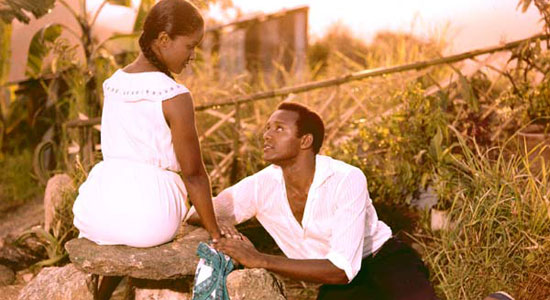MAGNET contributing editor Jud Cost is sharing some of the wealth of classic films he’s been lucky enough to see over the past 40 years. Trolling the backwaters of cinema, he has worked up a list of more than 100 titles—from the ’30s through the ’70s—that you may have missed. A new selection, all currently available on DVD, appears every Friday.

Black Orpheus (1959, in Portuguese with English subtitles, 100 minutes)
Black Orpheus is that rare movie where the music is so infectious, it dances through your head for days afterward. Shot in gorgeous color during Carnaval in Rio de Janeiro, director Marcel Camus’ groundbreaking film sports a soundtrack, written and played by Antonio Carlos Jobim and Luis Bonfá, that introduced the world to Brazil’s bossa nova, a slippery-yet-melodic jazz/pop idiom with the samba as its aorta, pumping an irresistible rhythm to all parts of the body.
The picture broke important cultural barriers, too, with its all-black cast. Even though they weren’t filmed kissing onscreen, Breno Mello, with his Harry Belafonte-like good looks, and wholesome, girl-next-door beauty Marpessa Dawn helped the film gain traction in what had previously been a mostly lily-white, art-house movie crowd.
Anyone with an elementary knowledge of Greek mythology would know that when a shy country girl named Eurydice (Dawn) meets a carefree trolley driver named Orpheus (Mello) during the orchestrated chaos of Brazil’s version of Mardi Gras, there might be trouble brewing. A jumpy Eurydice has fled to Rio to stay with her cousin, Serafina (Léa Garcia, a rail-thin Venus Williams lookalike), to escape a spurned suitor from her hometown. Dressed as Death in a skeleton suit and skull mask, the stalker has also arrived in the big city to spy on his prey by mingling with the garishly costumed crowd, endlessly dancing to the throbbing strains of “O Nosso Amor.”
Benedito (Jorge Dos Santos) and Zeca (Aurino Cassiano) are two refreshing young kids who worship Orpheus for his guitar and vocal prowess. They believe that when he picks out a melancholy tune on his guitar (“Manha De Carnaval”), he makes the sun rise. Both pre-teens showcase gravity-defying dance moves that might have brought a smile to the face of the young Michael Jackson. Although the vibe of the city may have been sanitized somewhat for Black Orpheus, it’s still unsettling to see how the marauding gangs of machine-gun-wielding teenagers portrayed in 2002’s City Of God have changed Rio’s large-screen face in a mere 40 years.
Black Orpheus, too, has its violent moments. In a ballet-like confrontation high on the shantytown cliffs overlooking the city center, the masked man warns Orpheus over Eurydice’s unconscious body, “Take good care of her—I’m in no hurry,” before vanishing into the night. Next morning, Orpheus decides to conceal Eurydice’s identity by dressing her as the heavily veiled Sun Queen in his Babilonia neighborhood’s dance-troupe entry in the sprawling parade that highlights Carnaval. Clad in a flashy Roman gladiator’s outfit and brandishing a gold-tinfoil-covered cardboard sun, Orpheus and his newfound love dance off, down the steep hill, to meet their destiny.






